See how much solar panels cost in your area

Please enter a valid zip code.
Zero Upfront Cost
Best Price Guaranteed
![]()
![]()
Solar Learning Center > Solar Panel Cost > Solar Panel Cost Calculator
Solar Panel Cost Calculator
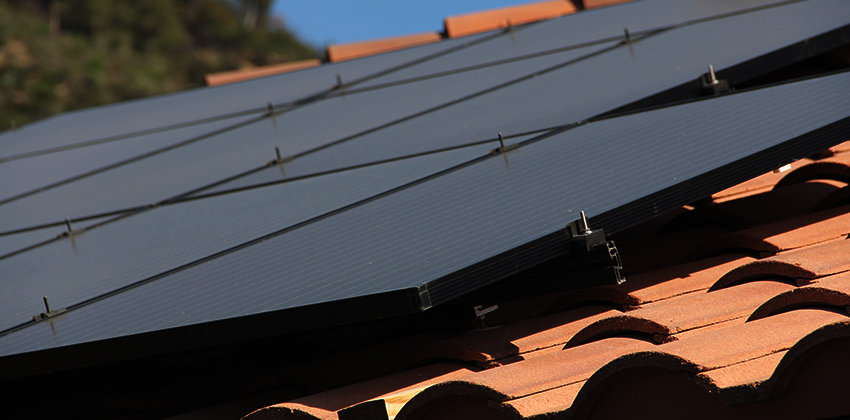
Getting a sense of how much solar panels cost — even before you are serious about going solar — is important for several reasons.
First, it gives you a baseline so you can easily spot scams and solar quotes that are too good to be true. Second, it takes the edge off of sticker shock. And third, it gives financial goals to start working toward by saving money and/or improving your credit to qualify for financing.
In this article, we’ll explore:
- How to use our solar panel cost calculator
- How people save money with solar panels
- Calculating solar costs in California
- Why use a solar cost calculator?
- Will solar panels get cheaper this year?
- Drawbacks of solar panels
Our goal, as always, is to give you the tools and knowledge to make educated decisions during the solar process.
How to use our solar panel cost calculator
Solar.com offers a free solar cost calculator that uses Google’s Project Sunroof and real-time utility rates to estimate how much you can save by going solar.
Using the calculator is easy. Click the link above to open it in a new tab, and we’ll talk you through how to use it!
First punch in your address and use the slider to set your average monthly utility electricity bill.
Next, select a financing preference (cash or loan) and decide whether you want to add home battery storage. Don’t fret about your initial settings, as they can easily be adjusted.
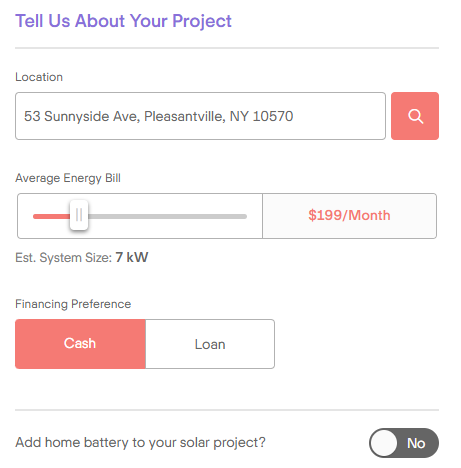
Once you’ve set your inputs, the calculator will generate a side-by-side comparison of your electricity costs before and after going solar. Let’s walk through some of the estimates and assumptions so you have a better understanding of what the results mean.
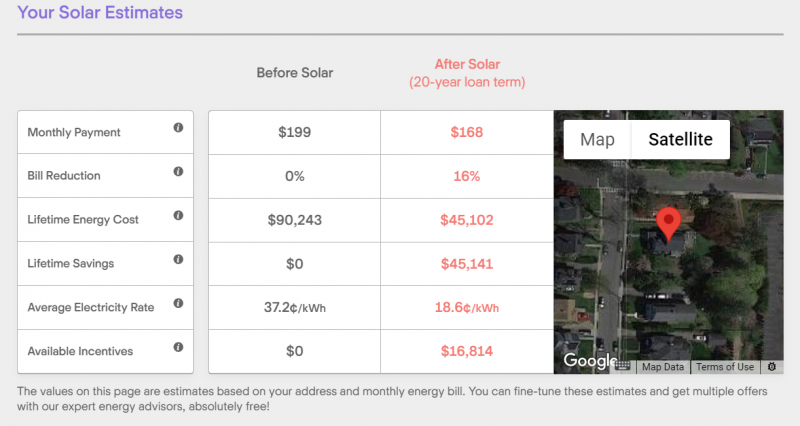
Saving estimates for a solar system in Westchester County, New York financed with a 20-year solar loan.
Monthly payment
For a cash purchase, your average monthly electric bill with solar panels is essentially flat fees that can’t be offset by net metering and any leftover electricity bill (this mostly pertains to California).
If you selected financing, the monthly payment represents your loan payment for a 20-year loan.
Your actual loan payments may vary based on current interest rates. It’s also worth noting that solar loan terms can be anywhere from 5 to 25 years.
This section essentially answers the question: How much money do you save a month with solar panels?
Simply subtract your after-solar payment from the before-solar payment to get a sense of your potential monthly savings.
Bill reduction
This figure represents how much of your utility bill you’re likely to offset in the first year of having solar panels.
If your loan payments are higher than your average utility bill, your bill reduction will show up as zero. However, that doesn’t mean you won’t save money in the long run by going solar.
Lifetime energy cost
If you select cash, this is essentially the estimated cost of your solar system and any flat fees your system can’t offset.
If you select a 20-year loan, this is a combination of the cost of the system, flat fees, and interest payments.
Lifetime savings
This is the difference between the lifetime energy cost before solar and after solar. This is much higher for cash purchases because there aren’t any interest payments.
Average electricity rate
Before solar, this represents the average utility rate over the next 20 years, assuming annual rate hikes between 3-5% (based on location).
After solar, this is essentially your lifetime energy cost divided by the total production of your system. Here’s how that looks for the example system above:
$45,102 / 242,483 kWh = 18.6 kWh
If you select cash purchase, the cost per kWh should be substantially lower.
Available incentives
This is an estimate of the solar incentives available in your selected area, including:
- The 30% federal solar tax credit
- State tax credits and rebates
- Municipal and utility incentives
We’ll be the first to point out that this calculator is based on assumptions and does not represent a binding solar quote. However, it can give you a pretty accurate estimate of how much solar can reduce your energy costs.
Do you really save money with solar panels?
It’s often hard to imagine spending $25,000 to save money on electricity costs, but people really do save money with solar panels.
One way to picture going solar is buying 25+ years of electricity at a bulk rate. Not only are you getting it at a discounted rate, but going solar flattens your electricity costs while utility electricity costs vary month to month and gradually rise over time.
In many ways, going solar is similar to buying a house. A mortgage can be more expensive than renting at first. However, it becomes the more affordable option over time as rent rates increase and your mortgage payments stay the same.
The graph below shows how ever-rising utility rates are much more expensive to pay for than solar panels over the 25-year life of a solar system.

Using the solar panel cost calculator in California
When it comes to home solar, California is, in many ways, an entirely different world than the rest of the US – especially with NEM 3.0 in effect.
NEM 3.0 solar billing essentially reduced export rates by 75% for customers of PG&E, SCE, and SDG&E that go solar after April 15, 2023.
With lower export rates, it’s harder to completely offset your monthly bill, and NEM 3.0 customers will typically have leftover electricity consumption to pay for. As such, the lifetime savings for solar-only systems isn’t as great as it is under 1-to-1 net metering.
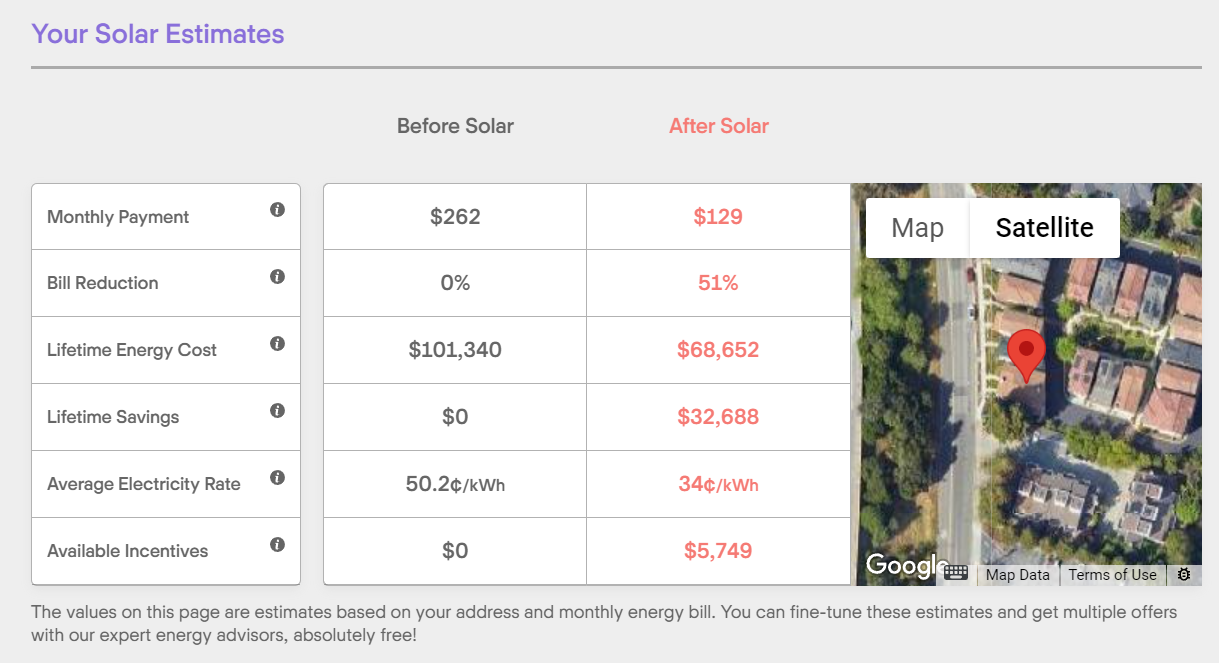
Savings estimates for a cash purchase in California under NEM 3.0 solar billing.
Is it still worth it to get solar panels in California?
Absolutely! The calculator page above shows that solar still provides tens of thousands in savings under NEM 3.0.
However, the key to maximizing savings under NEM 3.0 is to pair solar with battery storage so that you are exporting as little solar production as possible.
The video below walks through some tips to maximize the savings of a NEM 3.0 solar system.
See how much solar can reduce your electricity costs.
Why use a solar cost calculator?
We find that understanding the average cost of solar panels empowers homeowners to make better decisions when they get serious about comparing solar quotes.
Think of using the calculator like checking the Kelly Blue Book value of a car you want to buy. Just having a baseline solar panel cost can help you avoid scams, reduce sticker shock, and give you a head start on saving up cash or improving your credit to secure financing.
With that in mind, there are some limitations to using a solar calculator that it’s worth pointing out, like a more granular breakdown of solar costs.
How do I estimate solar installation costs?
First, the calculator doesn’t go into detail about how it came up with the cost of the solar system. That’s largely because every project is different and it would require additional assumptions.
So, how do you estimate things like solar panel installation labor cost or the cost difference of using the best solar panels versus cheaper ones?
One way is to use the solar panel installation cost breakdown below, which is based on Q1 2022 data analyzed by the National Renewable Energy Laboratory (NREL).

NREL found that in 2022 solar panel installation labor cost made up around 5% of the total cost of residential solar projects and the cost of the solar panel modules makes up around 18%.
So, if the calculator gave you a lifetime energy cost of $26,099 for a cash purchase, you can estimate that installation labor will make up around $1,300 and the solar modules themselves cost around $4,700.
The big takeaway is that, compared to non-labor soft costs, the cost of labor and solar modules make up a relatively small chunk of the overall project cost. With that information, you may decide that holding out for cheaper labor or hardware is not an effective – or recommended – way to reduce the cost of a solar system.
Will solar panels get cheaper in 2023?
There are competing market forces pushing and pulling the price of solar panels in 2023. These include supply chain tangles leftover from the pandemic, trade tariffs, a surge in US manufacturing, and local policy changes.
In the 2010s, the price of solar panels plummeted at a tremendous rate as technology improved and solar adoption hit critical mass. This trend was uprooted during the pandemic as shutdowns and materials shortages tied supply chains into knots and increased the price of, well, everything.
This is illustrated in the chart below.
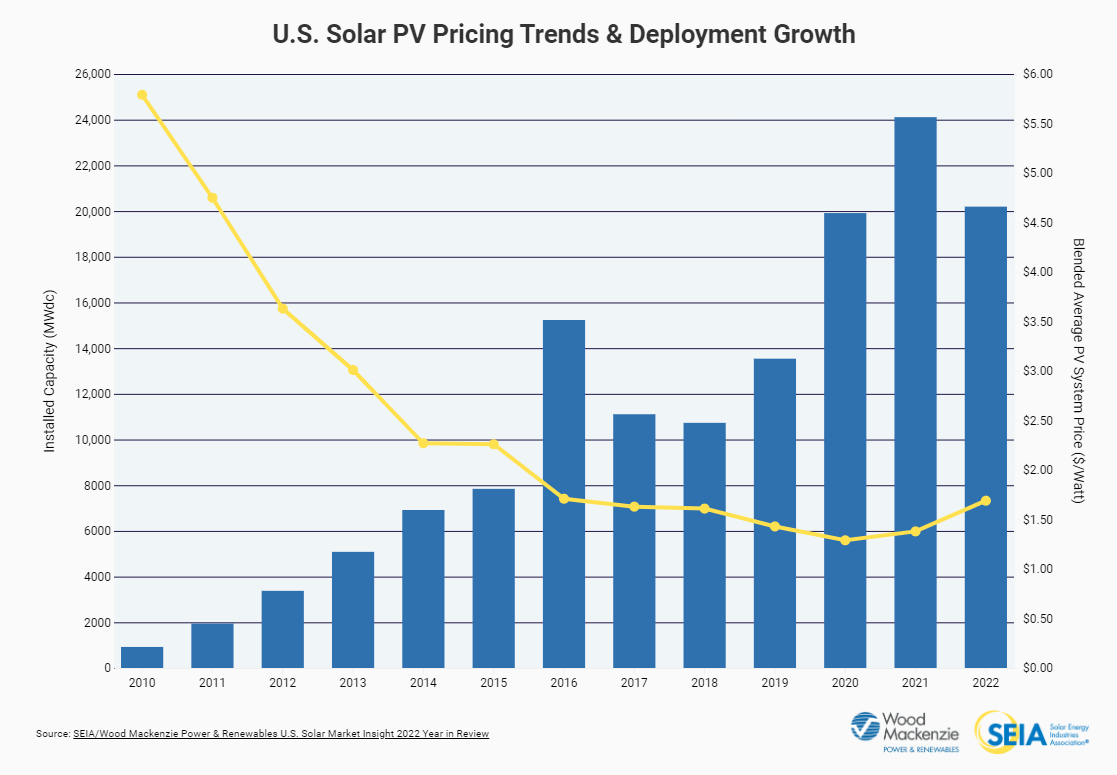
With inflation leveling off, it seems there’s a chance solar panels will get cheaper in 2023. For example, the price of polysilicon — a main ingredient in solar panels — has been on a steady decline in 2023, suggesting that module prices could follow.
![]()
It’s also worth paying attention to the massive boom in US solar panel manufacturing spurred by incentives in the Inflation Reduction Act and how it affects solar panel prices.
Manufacturing modules in the US should cut down shipping costs and make panels more readily available. On the other, the US has higher labor standards and wages, which could make locally manufactured panels more expensive.
Finally, we’re already seeing solar prices decrease in California as a result of NEM 3.0. After taking effect on April 15, 2023, demand for home solar in California tumbled, leading many installers to drop their prices.
Reducing soft costs with SolarAPP+
The other thing to keep an eye on is a new software called SolarAPP+ that promises to streamline the permitting process of residential solar projects and thereby reduce timelines and soft costs.
Colorado recently set aside $1 million to help communities adopt SolarAPP+ and CALSSA estimates that 66% of Californians could soon be covered by the new software.
Non-labor soft costs account for 44% of residential solar costs, so the adoption of SolarAPP+ could have a substantial impact on lowering solar costs.
What are the negatives of solar panels?
The other thing our calculator doesn’t show is the downsides of solar panels. Every energy source has its pros and cons, and rooftop solar is no exception.
Intermittent energy production
Perhaps the most obvious downside to solar panels is that they can’t produce electricity without sunlight. This leads to intermittent production, which requires solar owners to have access to net metering or battery storage for solar to make sense.
Net metering is the billing structure that allows solar owners to earn credit for the excess energy they push onto the grid. This credit is used to offset the cost of electricity they pull off the grid when their panels aren’t producing.

Most states have net metering policies. However, there are ongoing efforts by utility providers in many states to weaken or remove net metering altogether. Following the approval of NEM 3.0 in California, it’s expected that states will follow suit and adopt less favorable solar billing policies in coming years.
Cost barriers
The second negative of solar panels is that they are still cost-prohibitive to many low- and moderate-income households.
Solar panels typically cost around $25,000 (before incentives). Many homeowners don’t have that kind of cash lying around or strong enough credit to qualify for financing. This creates a barrier to rooftop solar and the energy cost savings it provides.
Furthermore, there’s a theory that residential solar makes grid electricity more expensive for low-income households that can’t afford to install solar panels. This “cost shift” theory posits that utilities make up for lost payments from higher-income households with solar panels by increasing rates for the lower-income households that can’t afford to go solar.
Scams and shoddy installers
Finally, the solar industry is not without its scams and shoddy installers that make life more difficult for everyone. Most solar panel regrets stem from nightmare experiences with installers who provide poor quality work and worse customer service.
At the end of the day, installing solar panels is a construction project and it’s important to hire a reputable contractor with a track record of excellent workmanship.
On solar.com, we make finding local installers you can trust easy because we do the work of rigorously vetting every solar company in our network. In fact, fewer than 30% of the installers that apply to our network are accepted.
Recap
Our solar cost calculator is a great tool for getting a sense of how much solar costs and how much you can save by going solar. However, every calculator is limited by its assumptions and its results should be taken with a grain of salt.
Getting a baseline idea of how much solar panels cost can help you enter the solar process more informed and confident.
Like all energy sources, rooftop solar has its pros and cons. However, it is one of the few ways to take control of your essential electricity costs and reduce your dependence on a utility provider.
To see exactly how much solar costs for your home, get binding quotes from vetted installers on solar.com.
Related Articles
Solar Panel Cost per Square Foot: How Much Will Solar Cost For...
If you’re curious about solar, it’s a great idea to get a rough estimate of how much solar panels cost before talking to a salesperson....
How Much Is a Solar System for a 2,000 Sq Ft House?
Home solar has many benefits, but it can be intimidating to start a project. After all, it’s no secret that installing solar panels costs tens...
How Much Do Tesla Solar Panels Cost?
Whether you’re a fan of Elon Musk or not, Tesla is one of the most recognizable brands for rooftop solar, battery storage, and electric vehicles....
How Much Is a Solar System for a 2,500 Square Foot House?
Before taking on a major home upgrade like installing solar panels, it’s nice to have a rough idea of how much it will cost. After...
Solar Panel Cost Calculator California: 3 Ways to Estimate Your Cost
Installing solar panels is not only a major construction project, it’s also an investment in reducing your energy costs and carbon emissions. As such, it’s...
How Many Solar Panels Do I Need for a 1,500 Square Foot...
One of the first questions homeowners ask solar companies is, “How many panels do I need?” There’s just something satisfying about being able to put...
See how much solar panels cost in your area.

Please enter a valid zip code.

Please enter a valid zip code.
Zero Upfront Cost. Best Price Guaranteed.




